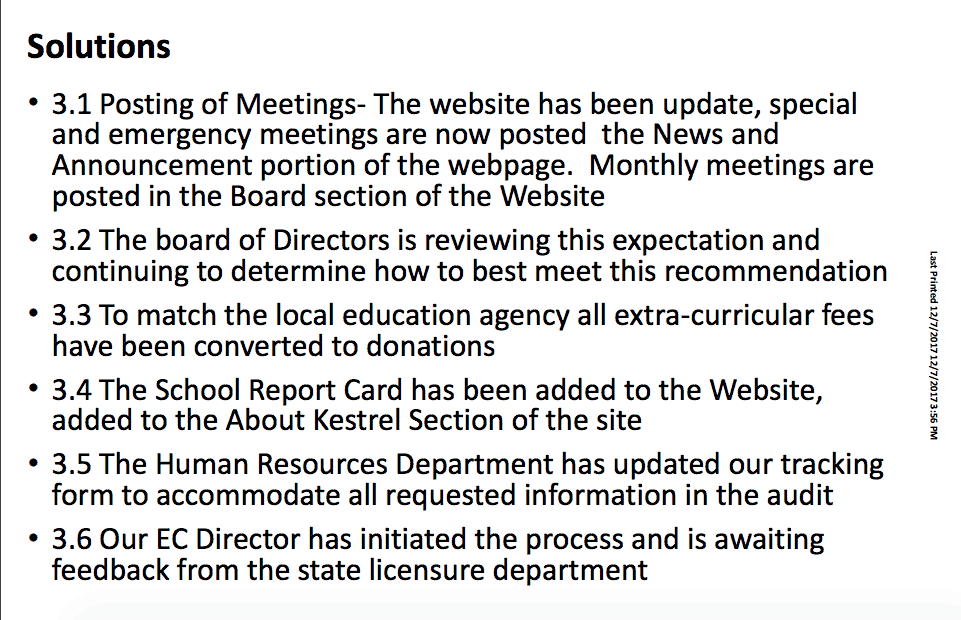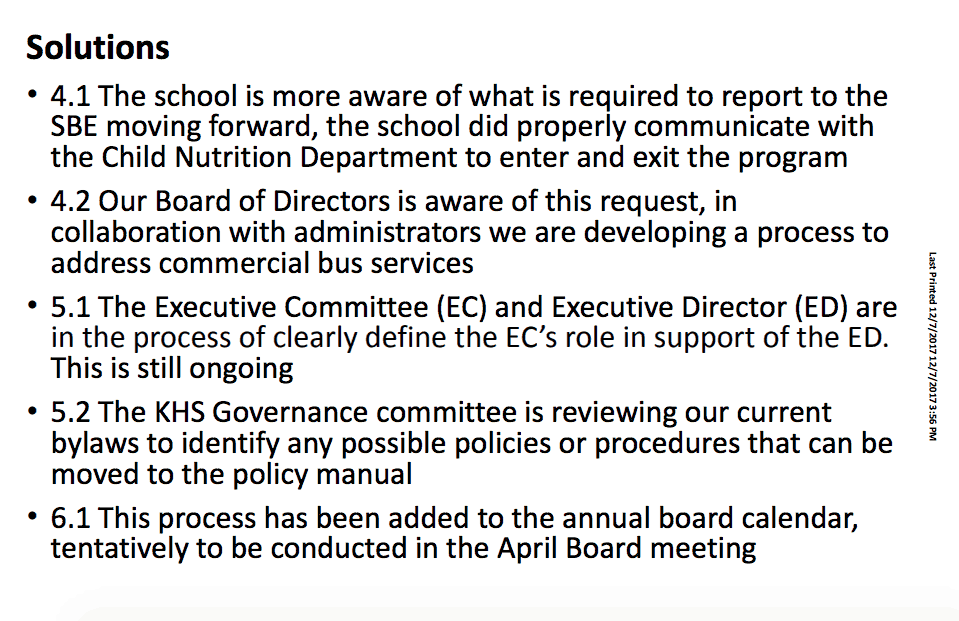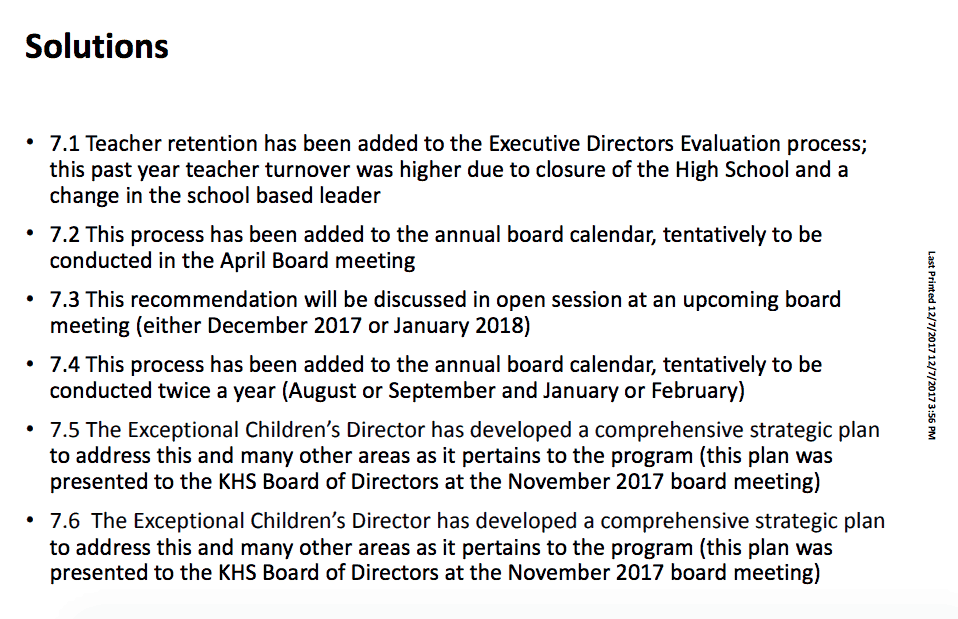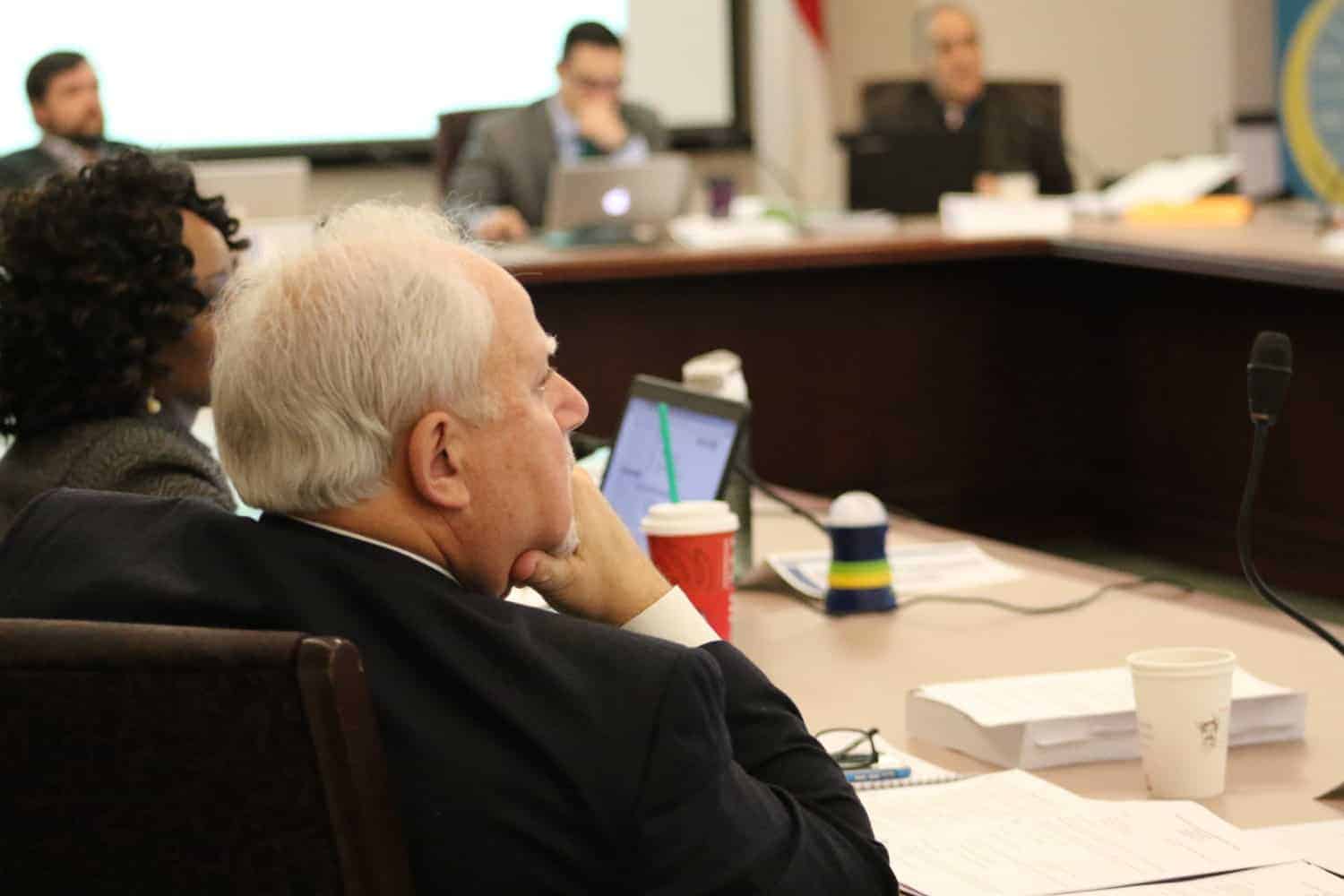Kestrel Heights, a charter school that graduated 160 students without the appropriate requirements since 2012, shared mostly positive results of a required audit with the Charter School Advisory Board (CSAB) Tuesday.
The external auditor, Leaders Building Leaders, found “no direct evidence of a current institutional flaw in record keeping, student accounting, staff monitoring, and executive oversight with regard to their K-8 operations at KHS,” the document states.
Mark Tracy, the school’s executive director, thanked the board multiple times for giving the school another chance to prove itself. The State Board of Education made the decision in March, with a recommendation from the CSAB, to close the school’s high school and keep grades K-8 open.
“We look forward to continue the relationship with the Office of Charter Schools and the Charter School Advisory Board to show that the decision to keep Kestrel Heights open was not a mistake,” Tracy said.
The audit did include several recommendations to improve the school’s services and operations, as well as notices of noncompliance with state and federal laws and State Board of Education policy.
“Though there were no significant findings, this does not mean there aren’t areas for growth and development in improving for us as an organization,” Tracy said.
When it comes to ensuring compliance with federal and state statute, the audit found and suggested the following:
- Make emergency school board meetings more accessible on the school’s website.
- Create an official transportation plan.
- Make sure the school’s pay-based extracurricular activities do not exceed Durham Public Schools’ fees.
- Clearly display the school’s state report card online.
- Improve the school’s licensure monitoring plan for teachers.
- Require that the school’s executive director obtains state licensure.
Regarding SBE policies, the external audit stated the school:
- did not request official permission as they should have to participate and then leave the federal free and reduced lunch program and
- should develop a safety plan regarding busing services.
To improve its bylaws, the auditor suggested:
- clarification of the executive committee’s power related to the school’s board and
- moving some parts of the school’s bylaws to its policy manual for efficiency purposes.
The audit found the school needed a policy to annually review any changes the school makes to its charter amendments. The document makes the following recommendations regarding internal controls and operational findings:
- Conduct a review of the school’s personnel process and adopt a teacher retention improvement goal.
- Create a board process for the review of contracts over $75,000.
- Ensure accurate reporting of employee attendance.
- Implement a licensure tracking process to ensure the school meets the required 50 percent mark for certified teachers in charter schools.
- Conduct a full internal review of the Exceptional Children Department.
- Create a clear written process for ChildFind and MTSS along with training for teachers.
The full audit is below.
Tracy laid out the solutions the school is implementing based on the auditor’s suggestions in his presentation to the board Tuesday. Find those slides below.



Heritage Collegiate appeal
Dave Machado, director of the Office of Charter Schools, updated CSAB members on Heritage Collegiate Leadership Academy’s plan to appeal the state board’s revocation of its charter to the Office of Administrative Hearings. The state board decided to move forward on its revocation of the Bertie County charter school last week after the school originally appealed that decision.
The school has 60 days to officially appeal. Machado said the school is receiving funds on a monthly basis as it stays open in the meantime. CSAB members were concerned that the school could delay the process and open its doors for such a long period of time. Heritage’s charter was revoked for academic, governance, and financial issues.
“We need to be able to pull the plug quicker and not allow this kind of debacle to continue on at taxpayer expense and no good to those students,” said member Alan Hawkes.
CSAB members wondered if the state law allowing the appeal period could be changed. Member Lindalyn Kakedelis said she did not want the delayed closure to be seen as a lack of charter oversight by the board.
“The best news about charter schools is that if they do not perform, we shut them down,” Kakedelis said. “And that’s what’s so great about charter schools. As being on the former board of education, I saw low-performing schools back in 1990 and they’re still low-performing today. So I think this is a benefit of charter schools, but yet I don’t want to see people use it to our disadvantage.”
Machado said his office has made multiple visits to Heritage, monitored their board’s monthly minutes, hosted trainings at the school, and been in constant communication.
“And then the ultimate decision was to close them down,” Machado said. “That’s the ultimate accountability.”
Low-performing school updates and application reviews
Seven continually low-performing charter schools, which have not exceeded the state’s growth standard and received failing performance grades for at least two of the last three years, presented their plans for improvement to the board Tuesday.
Leaders from Children’s Village Academy in Lenoir County, Haliwa Saponi Tribal School in Halifax County, PreEminent Charter School in Wake County, Wilmington Preparatory Academy in New Hanover County, Z.E.C.A. School of the Arts in Onslow County, United Community in Mecklenburg County, and Capital Encore Academy in Cumberland County explained their challenges.
Several schools shared that most of their low achievement comes from students who arrive at the charter school one or two years below grade level proficiency. Some schools are hiring subject specialists to improve particularly low scores. Some are implementing digital assessment tools like iReady, which identifies gaps in students’ skills and provides practice based on students’ learning levels. Some are focusing on correcting behavioral issues.
Though all the schools were struggling on proficiency, some were showing more improvement than others. CSAB members were particularly worried about Z.E.C.A. School of the Arts, located in Jacksonville. Stacey Owens-Howard, the school’s executive director, emphasized her plan to address the social, emotional, and behavioral issues within the school’s student population. She said there is a fourth grader at the school on parole, multiple students involved with the Department of Social Services, and around half of students in need of mental health services.
CSAB member Joseph Maimone said he is worried results are not there despite plans to change. Exceeding growth this year is necessary for the school to stay open.
“I would try to figure out who are the experts out there on what it takes to exceed growth and I would put every cannon I can aimed at how do we exceed growth for 169 kids,” Maimone said. “I mean, that’s what it’s going to come down to here.”
The school struggled with a small facility and has been fiscally noncompliant in the past. Owens-Howard said now that those two issues have been solved, the school is focusing strictly on academics.
“That F is hanging in the lounge where we do trainings for the teachers, and we talk about that F every month, and what are we going to do to change it.”
The second half of the board’s meeting was spent reviewing applications for seven new charter schools, five of which were invited for an official interview with the board at its January meeting.
Bishop George W Brooks Academy in Guilford County, MINA’s Place in Lee County, Ridgeview Charter School in Gaston County, Clara Science Academy in Mecklenburg County, and Kaleidoscope Charter High School in Wake County received the chance for an interview next month. Carolina Experimental School and CE Academy, two Chinese immersion schools proposing to locate in Wake County, were rejected by the board.
The first part of the board’s process involves discussing the applications in committees within the board. There are two committees: policy and performance. Each committee is assigned applications to read beforehand. Members either pass or fail sections of the schools’ applications. After discussing and asking any clarifying questions to representatives of the potential charter school, the committee decides whether to recommend an invitation for an interview to the full board.
The two schools who were rejected were encouraged to revise their applications and apply again next year. Carolina Experimental School’s application was not completed on time. Though Wenyu Bai said he thought his unconventional approach deserved consideration anyways, most board members did not think the state board policy could be broken.
CSAB member Hawkes did not agree and voted against the board’s rejection.
“If we forego a possible great opportunity with this school over something like one missing resume, I’m not so sure that reflects very well on us,” Hawkes said. “If the greater good to all the possible children we’re sweeping away because we’re hung up on one resume.”



